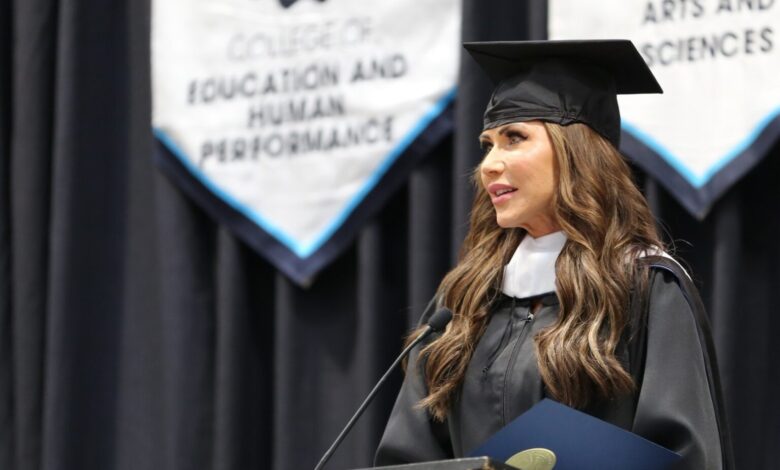Noem’s honorary degree sparks protest; meanwhile, a student she’s trying to deport earns a doctorate

An international student in western South Dakota overcame Kristi Noem’s attempt to stop her from graduating Saturday, while hundreds of people protested on the other side of the state where Noem received an honorary degree and delivered a commencement speech.
The international student is Priya Saxena, from India. She received two degrees from South Dakota Mines in Rapid City: a doctorate in chemical and biological engineering and a master’s degree in chemical engineering.
Noem’s U.S. Department of Homeland Security — which she has led since resigning as South Dakota governor in January — has been trying to deport Saxena since last month, asserting that Saxena’s permission to stay in the country should be revoked because she was convicted four years ago of failing to move over for flashing yellow lights, a misdemeanor. The action is part of a broader immigration crackdown by the Trump administration.
Saxena’s student visa is not scheduled to expire until 2027, and if allowed to stay in the country, she could apply for an extension to work in fields related to her degrees.
Saxena and her attorney, Jim Leach, of Rapid City, sued and won a temporary restraining order that assured Saxena’s graduation and will halt the government’s action against her until at least next week, when she has a hearing on her request for a court order to stop her deportation while the lawsuit proceeds. Saxena and her attorney have said in court filings that she has not committed a deportable offense, and have called the government’s actions “lawless.”
Saxena’s graduation went smoothly Saturday as she crossed the stage and received applause from the audience at Summit Arena in Rapid City. Her attorney and a university spokeswoman said Saxena preferred not to make any public comments.
Meanwhile in Madison
About 350 miles to the east at Dakota State University in Madison, Noem’s speech and her acceptance of an honorary doctorate in public service went off without a hitch inside the university fieldhouse, where she did not reference the protesters or make any comments about her official duties.
Outside, she was loudly opposed.
Students and community members lined the sidewalks chanting phrases including “no honor for Noem” and “due process.” Protesters said they were spotlighting Noem’s “cruel” immigration policies and the university’s decision to invite her to graduation.
“One thing that immediately came to my brain when I heard she was coming here was I was genuinely scared for the massive amounts of international students that we have on campus,” said student Maya Plummer. “That’s something we take pride in.”
The ceremony in Madison included foreign students from countries such as Vietnam and India.
Noem’s department has pursued enforcement actions against more than 1,000 international students. It has also removed temporary protected status for immigrants who fled danger in their home country, wrongly deported a Maryland man to a notorious prison in El Salvador, aired TV ads warning migrants to self-deport or avoid coming to the United States, and launched an initiative to provide up to $1,000 in “travel assistance” to immigrants without legal authorization who self-deport, among other actions.
This week, U.S. Sen. Chris Murphy, D-Connecticut, accused Noem of running a department that’s “out of control,” saying it’s at risk of spending all of its $65 billion in funding before the end of the fiscal year.
The Dakota State University student senate and general faculty both voted against the honorary degree for Noem, citing concerns over Noem’s policies and the message her recognition would send to international students and marginalized communities.
University spokespeople said they extended the invitation for Noem to speak and receive the honorary degree while she was still governor of South Dakota. The invite was based on her longstanding support of the university’s nationally recognized cybersecurity programs.
Dakota State President José-Marie Griffiths said in her speech that Noem is among “a number of individuals who were instrumental in changing the trajectory of this institution” in recent decades. She said the university was transformed from one that was losing enrollment to one that’s thriving as a flagship institution for computer technology.
“And by the way, there were protests for that decision, too,” Griffiths said.
Noem gave students a five-point bullet list of advice during her approximately 10-minute speech.
She told students their education is important, “But I will tell you that the world still revolves on relationships. People will be successful based on the people that they know and the people that they spend time with.”
Her other advice for students included, “You believed in Santa Claus for many years, at least believe in yourself for five minutes.”
Attendees react
Among attendees, there were conflicting views about the protest. Some family members of graduates expressed frustration that the controversy overshadowed the event.
“Honestly, it’s shocking because I feel like we should be here just celebrating the graduates,” said Anico David of Sioux Falls, whose sister graduated. “People are making it bigger than it should be with all this protesting. In my opinion, it’s kind of out of pocket and unnecessary.”
Max Lerchen, who earned a master’s degree, said honoring Noem “does not reflect the values that are held by the university,” such as inclusion. He said university officials should have expected opposition, and protesters should not be blamed for pushing back.
“They knew it was going to be an unpopular decision to begin with,” he said. “I think that’s similar to being picked on by a bully, and you decide to fight back, and then people go, ‘Why did you fight back?’”
Andrew Sogn, a spokesman for Dakota State University, said the institution hoped for “a celebratory atmosphere, and recognition of the graduates and their hard work.”
When asked about the students and faculty who opposed Noem’s honorary degree and speech, he said it was welcome, “because I think that we encourage open conversation and freedom of expression.”




